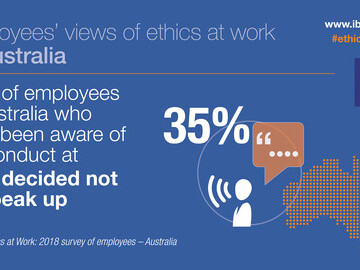New survey reveals extent of misconduct in Australian workforce
A quarter of Australian employees have been aware of misconduct, but a third didn't speak up
Sydney, 27 November 2018: More than third of workers who are aware of misconduct at work remain silent according to new research by The Institute of Business Ethics (IBE), in Partnership with The Ethics Centre.
The ‘Ethics at Work’ survey of 752 Australian workers found 1 in 4 (24%) have been aware of misconduct during the past year at work. Yet 35% of those workers decided not to speak up. When asked what influenced their decision, 32% said they felt speaking up might jeopardise their job; 27% did not believe that corrective action would be taken.
John Neil Co-Head of Advice and Education at The Ethics Centre said:
“At The Ethics Centre, we believe that employees’ views are a key indicator of the ethical temperature of any organisation”
“These results reveal that many Australians don’t trust that the current systems for speaking up against unethical behaviour are there to support them, and are choosing to stay quiet or compromise their own values”.
Of those who were aware of misconduct at work, the most common types were bullying and harassment (41%), inappropriate or unethical treatment of people (39%) and misreporting of working hours (32%).
In addition, the findings also reveal that 1 in 10 (13%) have felt pressured to compromise their organisation’s ethical standards in the workplace.
The report also finds that the majority of workers believe honesty is practised regularly at work (84%). However, 14% feel that practicing honesty is either occasional or rare in their workplace.
Philippa Foster Back CBE, Director of the IBE said:
“Global movements like #metoo and #timesup are having ramifications throughout the workplace, not just in terms of people speaking up about harassment, but in feeling empowered to raise concerns about other issues.”
“Employees are under more stress to deliver than ever before, and this is increasing the pressure to then cut ethical corners. These figures should be seen as a warning sign to organisations that they need to be more supportive of their employees when it comes to making ethical decisions.”
The survey data highlights the importance and impact of corporate ethics programs within the workplace.
Employees who work in a ‘supportive environment for ethics’ (for example, where line managers explain the importance of ethics at work; where organisations live up to stated policies of social responsibility) are:
ENDS/
Download advance copies of the reports:
Ethics at Work 2018 Survey of Employees: Australia, New Zealand and the UK
Ethics at Work 2018 Survey of Employees: Australia
To organise interviews please contact: The Ethics Centre or Institute of Business Ethics
EDITORS’ NOTES
Extended key findings from the report:
1. High awareness of right and wrong in everyday choices
The majority of surveyed participants are clear on right or wrong everyday workplace behaviours.
● 67% say taking pencils and pens from work is unacceptable
● 52% rate personal internet use during work hours as unacceptable
2. Unethical behaviour common at work
A quarter of employees say they have been aware of misconduct at work during the last year.
● Men who are aware of misconduct are also more likely to be aware of instances of discrimination than women in a similar position (14% vs. 5% respectively)
3. Honesty at work
84% of participants say honesty is practised always or frequently at work. However, 14% rank it as occasionally or rare.
● Older employees (55+) are more likely than other age groups to say honesty is practised always/frequently (90% vs. 82% 18-34 and 83% 35-54)
● Employees in SMEs are more likely than those working for large/very large organisations to say honesty is always practiced (32% vs. 23%)
4. Pressure to compromise the organisation’s ethical standards
Around 1 in 10 (13%) of employees say they have felt pressured to compromise their organisation’s ethical standards.
● The five most common reasons employees felt pressured to compromise on their organisation’s ethical standards are time pressure (34%), following the boss’s orders (31%), under-resourcing (23%), peer pressure to be a team player (23%) or to meet unrealistic objectives or deadlines (21%).
● Employees who have felt pressured to compromise their standards are also more likely to disagree that their organisation engages responsibly in all its business dealings with stakeholders (24% vs. 6% who did not feel pressured) or to agree that their manager rewards results even if they result from ethically questionable practices (43%).
Download the complete reports below:
Ethics at Work: 2018 Survey of Employees: Australia, New Zealand and United Kingdom
By Guendalina Dondé
ISBN 978-1-908534-40-8
Publication date: 27 November 2018
Ethics at Work: 2018 Survey of Employees: Australia
By Guendalina Dondé and Katja Somasundaram
Publication date: 27 November 2018
About the report
The Institute of Business Ethics (IBE), in partnership with The Ethics Centre, commissioned a survey of 752 Australians aged 18 and over to gather information about their attitudes towards ethics. The survey was nationally representative of working adults across age groups, genders and sectors, corporation sizes and positions. This survey was undertaken by ComRes (a member of the British Polling Council). It is the first national ethics survey of Australian workers.
The survey was undertaken between 5-25 February 2018, and full data tables are available at www.comresglobal.com
The Ethics Centre
The Ethics Centre is an independent not-for-profit organisation that has been working for 30 years to help people navigate the complexity and uncertainty of difficult ethical issues through innovative programs, services, events and experiences.
The Centre provides consulting, education and counselling services to organisations interested in improving their capacity to respond to challenging issues through business ethics. At the core of The Ethics Centre’s work is a commitment to assisting organisations to develop and refine their Ethical Framework of purpose, values and principles.
www.ethics.org.au @ethics_centre
The Institute of Business Ethics
The Institute of Business Ethics, whose purpose is to promote high standards of business behaviour based on ethical values, is an important partner to any business wanting to preserve its long-term reputation by doing business in the right way.
For over 30 years, the IBE has advised organisations on how to strengthen their ethical culture by sharing knowledge and good practice, resulting in relationships with employees and stakeholders that are based on trust. The IBE is a registered charity funded by corporate and individual subscriptions.www.ibe.org.uk @ibeuk
The author: Guendalina Dondé
Guendalina Dondé is Senior Researcher at the Institute of Business Ethics. She writes and researches on a range of business ethics topics for the IBE. Before joining the IBE, she collaborated in developing the code of ethics for the Italian Association of Management Consultants and worked for a European CSR Business Network in Brussels. She holds a Master’s degree in Business Ethics and CSR from the University of Trento in Italy.
She is the author of the IBE survey report Corporate Ethics Policies and Programmes: 2016 UK and Continental Europe Survey and co-author of the 2017 IBE report Setting the Tone: a New Zealand perspective on Business Ethics, the 2017 TEI & IBE Ethics and Compliance Handbook, the 2016 IBE Codes of Business Ethics: examples of good practice and of the French and Italian editions of the 2015 IBE survey Ethics at Work: 2015 Survey of Employees. She is also responsible for reviewing corporate codes of ethics and related policies, benchmarking them against other organisations.
The IBE would like to thank the following IBE subscribers for their financial support for this project:
Gold supporters: Rolls Royce
Silver supporters: Aviva, Centrica, L’Oréal, Morgan Stanley
Bronze supporters: Expolink
Press release distributed by Pressat on behalf of Institute of Business Ethics, on Monday 26 November, 2018. For more information subscribe and follow https://pressat.co.uk/
Employees Survey Ethics Business Ethics Australia New Zealand UK IBE Business & Finance Education & Human Resources
You just read:
New survey reveals extent of misconduct in Australian workforce
News from this source:






